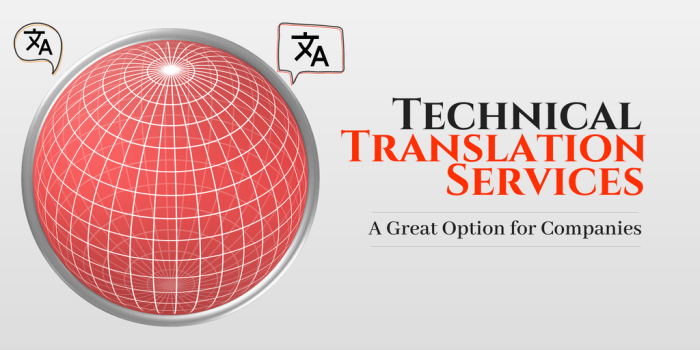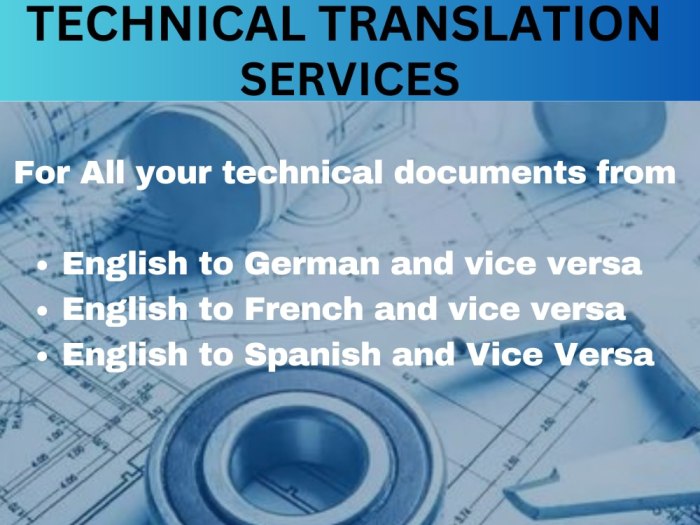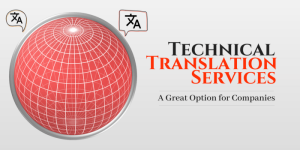
Technical translation services sets the stage for this enthralling narrative, offering readers a glimpse into a story that is rich in detail with entertaining interactive style and brimming with originality from the outset.
From unraveling the complexities of textile terminology to navigating the challenges of international logistics, the world of technical translation is as diverse as it is essential. Let’s dive into the intricacies of this vital service that powers global communication.
Technical Translation Services

Accurate technical translation plays a crucial role in various industries, including Textiles and Nonwovens, where precise communication of technical information is essential for product development and quality control.
Impact on Transportation and Logistics
In the Transportation and Logistics sector, incorrect technical translations can lead to serious consequences such as delays in shipments, miscommunication between teams, and safety hazards due to misunderstandings of technical instructions.
Role in Business Creation and Development
Technical translation is vital for Business Creation and Development as it enables companies to expand globally, reach new markets, and establish partnerships with international clients by ensuring clear and accurate communication of technical details and product specifications.
Challenges in Domestic Services
Language barriers can pose significant challenges in Domestic Services, where accurate technical translations are crucial for providing services like home repair, maintenance, and appliance installation. Misinterpretations can lead to misunderstandings, errors, and unsatisfactory outcomes for both service providers and customers.
Textiles and Nonwovens

Textiles and nonwovens are crucial industries that require accurate technical translation services to ensure seamless communication across global markets. In these industries, specific technical terminology plays a vital role in conveying precise information related to manufacturing processes, materials, and products.
Specific Technical Terminology in Textiles and Nonwovens
In the textiles and nonwovens industry, translators must be familiar with a range of technical terms such as:
- Fiber types (e.g. natural, synthetic, regenerated)
- Weaving techniques (e.g. plain, twill, satin)
- Dyeing and finishing processes (e.g. bleaching, mercerization, calendering)
- Fabric properties (e.g. tensile strength, abrasion resistance, colorfastness)
- Nonwoven production methods (e.g. spunbond, meltblown, needle punching)
Translating Complex Textile Manufacturing Processes
Technical translation services play a crucial role in translating complex textile manufacturing processes by ensuring accuracy and clarity in the communication of technical information. Translators with expertise in textiles and nonwovens can accurately convey intricate details of processes such as spinning, weaving, knitting, dyeing, and finishing, facilitating seamless collaboration and knowledge transfer between industry professionals worldwide.
Key Differences in Terminology Between Textiles and Nonwovens
Translators working in the textiles and nonwovens industry need to be aware of key differences in terminology between the two sectors, such as:
- Textiles refer to woven or knitted fabrics, while nonwovens are produced by bonding or interlocking fibers.
- Textiles often involve traditional weaving or knitting techniques, whereas nonwovens utilize specialized production methods like needle punching or thermal bonding.
- Textiles focus on fabric properties like drape and hand feel, while nonwovens emphasize characteristics such as filtration efficiency and barrier properties.
Transportation and Logistics
In the fast-paced world of Transportation and Logistics, precise technical translation plays a crucial role in ensuring the safety and efficiency of operations. Mistranslations can lead to misunderstandings, errors, and even safety hazards, making accurate translation services indispensable in this sector.
The Impact of Mistranslations
Mistranslations in transportation manuals can have serious consequences. For example, a simple mistranslation of a warning sign or instruction in a manual could lead to improper handling of goods or equipment, resulting in accidents or delays. In the logistics sector, a mistranslation in shipping documents could lead to misunderstandings between parties, causing disruptions in the supply chain.
Facilitating International Communication
Accurate translation services are essential for facilitating smooth communication in international logistics operations. From translating shipping documents and customs forms to interpreting communication between global teams, precise technical translation ensures that information is conveyed accurately and efficiently. This helps to avoid costly delays, misunderstandings, and errors in the transportation and delivery process.
Business Creation and Development
Technical translation services play a crucial role in helping businesses expand globally by breaking language barriers and facilitating effective communication across different regions. By translating technical documents accurately, companies can reach new markets, attract international clients, and establish a strong presence in various industries.
Market Penetration Through Effective Translation
- One successful example of market penetration through effective translation is the case of a software company that translated its user manuals and technical documentation into multiple languages. This enabled them to target international customers and significantly increase their sales in foreign markets.
- Another example is a manufacturing company that translated their product specifications and safety guidelines into various languages. This not only helped them comply with local regulations but also enhanced their reputation as a reliable supplier globally.
Impact on Business Negotiations and Contracts
- Accurate translations of business negotiations and contracts are essential for ensuring mutual understanding between parties from different linguistic backgrounds. Misinterpretations due to language barriers can lead to misunderstandings, disputes, and legal issues.
- By providing precise translations of legal documents, technical specifications, and contractual terms, technical translation services help businesses navigate international transactions smoothly and build trust with their partners and clients.
Domestic Services
Domestic service providers often face challenges in communicating with clients of diverse linguistic backgrounds. This can lead to misunderstandings, delays, or even loss of business opportunities.
Bridging the Language Gap
Technical translation services play a crucial role in bridging the language gap for domestic service companies. By providing accurate and culturally sensitive translations, these services help ensure clear and effective communication between service providers and clients.
Culturally Sensitive Translations
In domestic services, culturally sensitive translations are essential to avoid misunderstandings that may arise from differences in language, customs, or social norms. By taking into account the cultural context of both the service provider and the client, translations can help build trust and strengthen relationships.
Translation Services
When it comes to translation services, technical translation requires specialized skills that go beyond general translation. Technical translators must have a deep understanding of the subject matter, terminology, and industry-specific jargon to accurately convey the intended meaning.
Specialized Skills for Technical Translation
- Proficiency in the source and target languages
- Knowledge of technical terminology and industry-specific jargon
- Understanding of the subject matter
- Research skills to ensure accuracy
- Attention to detail to maintain precision
Quality Assurance in Technical Translation Projects
Quality assurance in technical translation projects involves multiple steps to ensure accuracy and consistency. This includes:
- Translation review by a second linguist
- Terminology management to maintain consistency
- Proofreading for grammar and spelling errors
- Formatting and layout checks
- Client feedback and revisions
Role of Technology in Technical Translation
Technology plays a crucial role in enhancing the efficiency of technical translation services. Computer-assisted translation (CAT) tools help translators manage terminology, maintain consistency, and improve productivity. These tools also enable collaboration among translators and clients, leading to better communication and faster project delivery.
Final Conclusion
As we wrap up our journey through the realm of technical translation services, it’s evident that accurate and precise language expertise is the cornerstone of successful international ventures. With the right translation partner by your side, the world truly becomes a smaller, more connected place.
Helpful Answers
How important is accurate technical translation in the Textiles and Nonwovens industries?
Accurate technical translation is crucial in these industries to ensure clarity in processes and products, avoiding costly mistakes.
What role does technical translation play in Business Creation and Development?
Technical translation services help businesses expand globally by ensuring effective communication with international partners and clients.
How can technical translation services benefit domestic service providers?
By bridging language gaps, technical translation services enable domestic service providers to effectively communicate with clients from diverse linguistic backgrounds.





